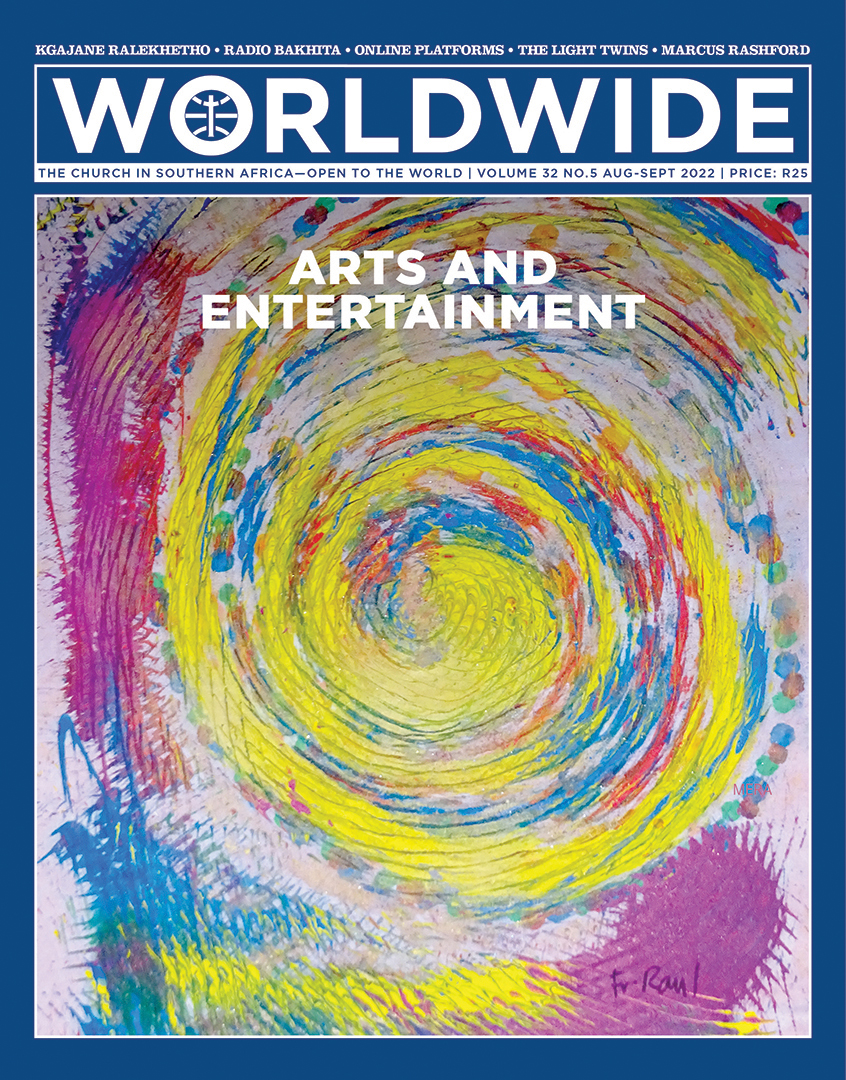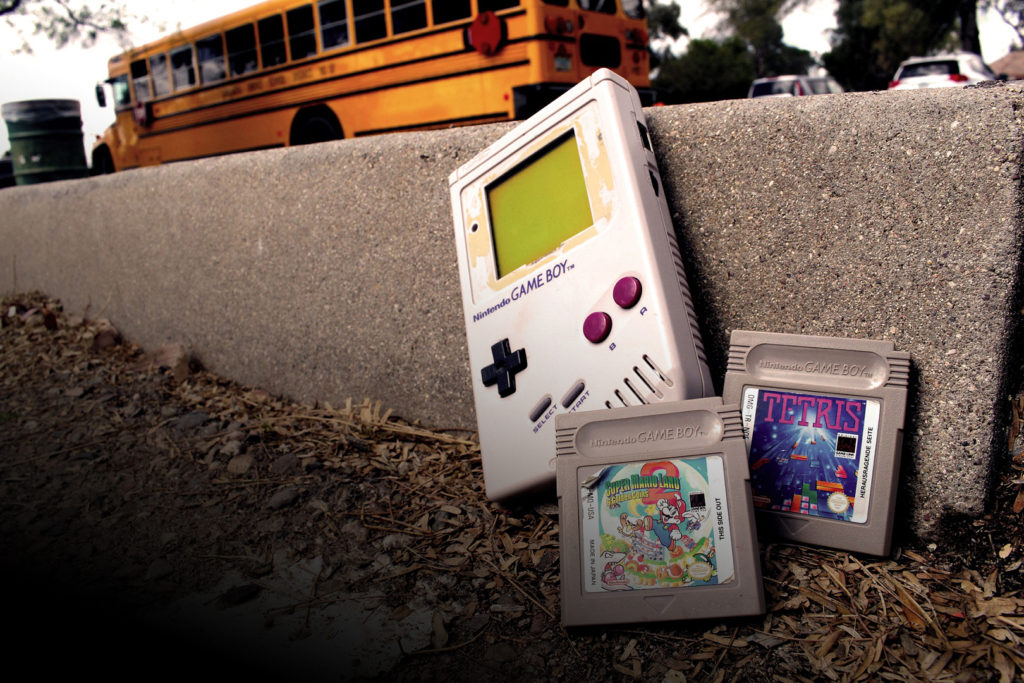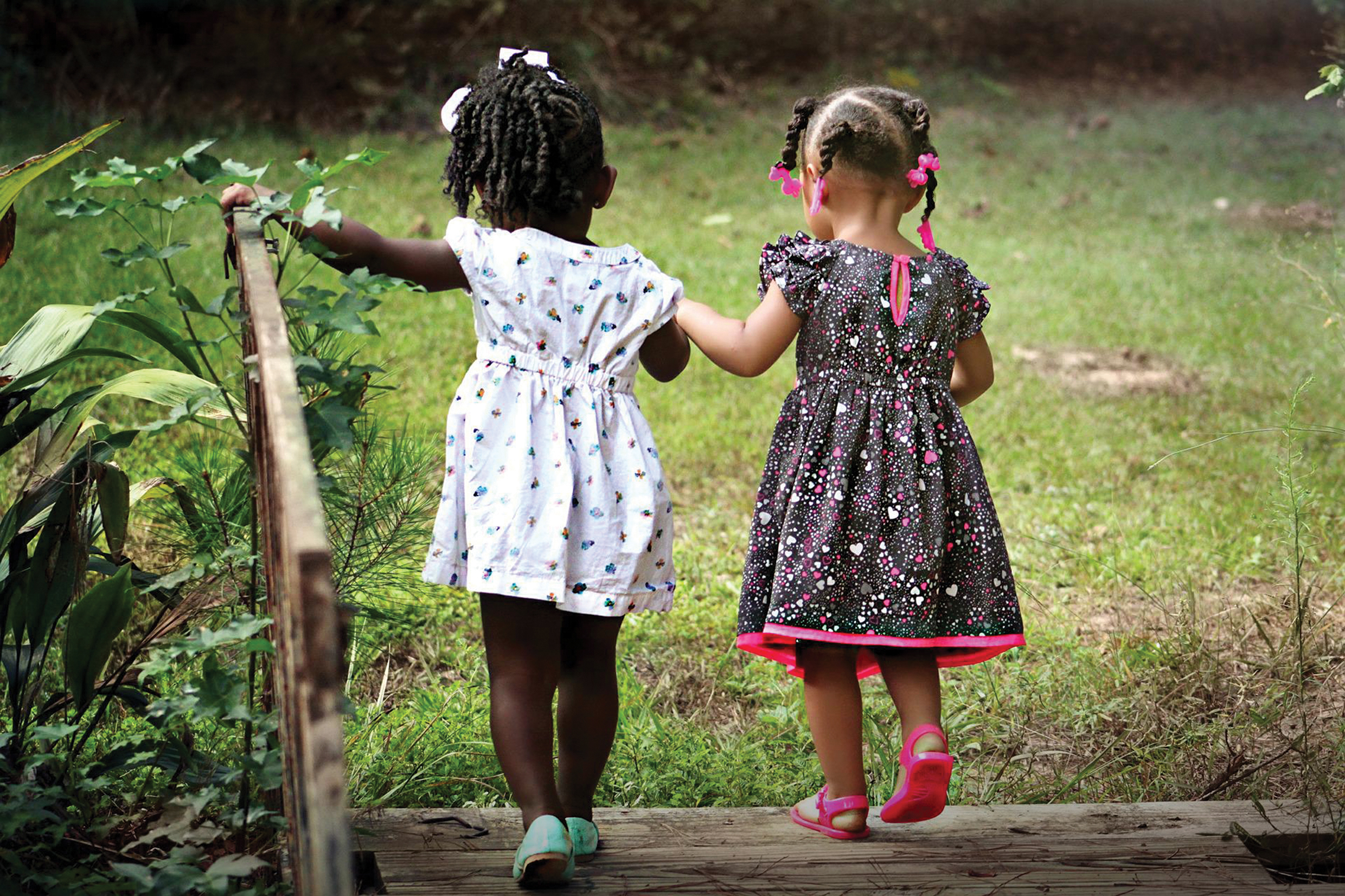
ARTS AND ENTERTAINMENT
This painting represents the turmoil experienced during a time of crisis. Typhoon is a symbol of anxiety, chaos, destruction and struggle. However, once those trial moments are surmounted, the inner energy of the typhoon brings transformation, putting life in order and strengthening one’s spirit. Emotional typhoon seems to tear life apart when it hits. One can’t turn away from it, but once it is over, it brings new potential; visions become clear and one sees brighter days ahead.
PAINTING BY FR RAUL TABARANZA MCCJ
YOUTH VOICES • MUSIC

Celebrating life through resonance with music
Music is a form of entertainment that has featured throughout history. It has a powerful influence in our lives and it is a vehicle to express our passions, to praise God or even a vehicle for hope
BY Jill Williams | Candidate Landscape Architect, Pretoria
OVER THE centuries, entertainment has taken many different forms from one civilisation to the next. The ancient Egyptians used to juggle, have pageants, hunt and fish. The Romans watched chariot races, combat between gladiators, or lions (or both). Wrestling and combat games also featured strongly in many cultures, including the Greek and Nguni nations. Many forms of entertainment have fallen away. Some have been revived, such as camel jumping in Yemen. Others only started being popular recently, like binge-watching of TV series. One form of entertainment, however, that has stood the test of time, is playing and listening to music. As Shakespeare said in the opening line of his comic play, Twelfth Night; “If music be the sound of love, play on!”
The power of melodies
Just like atoms being positively or negatively charged, we can shift moods and intentionally create the atmosphere we desire around us through the use of music. By playing joyful music in the morning when you wake up or on your way to work, you can go through the day feeling lighter and more energised, particularly when the music is God-focused. Not surprisingly, music has also been proven to boost memory in all age groups, aids in building task endurance. It can lighten one’s mood when playing non-melancholic or nostalgic tunes. Music also helps to reduce anxiety and depression, helps preventing fatigue, aids in improving one’s response to pain, and improves the effectivity of physical workouts. This has a lot to do with the length, frequency and speed of a sound wave. Sound is deeply rooted in our psyche. The vibrations and muffled sounds a baby hears and feels in the womb greatly influence the growth of the child. Similarly, the type of music played is important. Even plants have been proven to grow better when music with a faster tempo is played to it; however, very depressing slower tempo music tends to depress the plant (Oxford 2020). How much more so are we human beings affected? From the beginning of time God has spoken (Gen 1: 2); the very power of creation was triggered through the vibrations of the sound of the Word and continues to vibrate and echo throughout the universe today.
One form of entertainment that has stood the test of time is playing and listening to music
Musical genres
Over time, music styles fluctuate. We can observe very distinct categories and genres and combinations of various sounds from different periods and styles forming new genres still. Its fluidity, adaptability, relatability and ease of access make music arguably one of the most popular forms of entertainment in the world. By simply repeating, stretching, over-or under-emphasising a sound or a word, one crosses the delicate threshold between sound and song. From classical to rap, blues to rock, hip hop to pop, reggae to house and everything in-between, music has found a place on everyone’s physical, mental and virtual playlists. There is a constant hunger for the latest music and new trends particularly in the younger generation, while the more mature generation tends to prefer listening to old favourites. Preferences and relatability to certain genres of music can even be the cause of unity or division in families, friendship groups and societal groups. It can become a great challenge for families hosting multiple generations to sit in a room, listen to and actually enjoy a certain piece of music.
Music creates the atmosphere of a setting or event
Matter of dispute
This is particularly the case in families where grandparents and grandchildren live together. Here, complaints can be heard from either end of the spectrum; one form of music is being too loud and obtrusive, while the other is too slow and boring. Dancing and singing often accompanies the playing of music, which could add to the list of complaints due to the quality of the singing and appropriateness of dancing styles in different settings. If one overlooks this, it can also become an opportunity to enjoy little moments with family that most take for granted.

Source: Image by Renáta Adrienn Uri from Pixabay.
David’s wife, Michal, opposed David’s dancing before the Lord as he expressed his joy of the triumphal entry of The Ark of the Covenant into Jerusalem. In 2 Sam 6: 16, we see how Michal viewed King David’s actions as inappropriate: “Michal, daughter of Saul, came out to meet him and said, “How the king of Israel has distinguished himself today, going around half-naked in full view of the slave girls of his servants as any vulgar fellow would!” David said to Michal, “It was before the Lord, who chose me rather than your father or anyone from his house when he appointed me ruler over the Lord’s people Israel—I will celebrate before the Lord. I will become even more undignified than this, and I will be humiliated in my own eyes. But by these slave girls you spoke of, I will be held in honour” (2 Sam 6: 20–22). Is the playing of music and dancing thereto ever inappropriate when done for the glory of the Lord? A great event in the history of Israel was taking place and music exemplified the atmosphere. David’s dancing was inevitable.
Raising emotions
This is one of the qualities of music; that it creates the atmosphere of a setting or event. The use of this as a tool in sport, gaming, cinema, or other forms of entertainment and even in retail stores and eateries is strategically done to trigger certain emotions in consumers. Even now, I distinctly remember the soundtracks of the games that my brother and I would play as kids: from the Nintendo NES’s classic Track and field soundtrack, Hyper Olympic – Gentai Ban! by Konami (1985) to Mario Bros’ “Underground Theme” soundtrack in Super Mario World 2: Yoshi’s Island (1995), there are just some tunes that will forever be engrained in our memories. Even the theme songs of our favourite cartoons, series or movies never grow old. The chorus of Eye of the tiger by Survivor (1982) popularised by Rocky III (1982) will never fail to energise the athlete and Peabo Bryson and Regina Belle’s A whole new world (1992) in the movie Aladdin (1992) continues to spark hope and wonder in the eyes of young fans. Even a drop of ketchup can bring a happy jingle to mind.
Singing for God’s praise
In Is 6: 1–4 we read an account of heaven where God’s presence was hosted by the seraphim’s constant, foundation-quaking hymn of praise: “Holy, holy, holy is the Lord Almighty; the whole earth is full of His glory.”

Source: Image by Yerson Retamal from Pixabay.
“In communion with them, the Church on earth also sings these songs with faith in the midst of trial. By means of petition and intercession, faith hopes against all hope and gives thanks to the “Father of lights,” from whom “every perfect gift” comes down. Thus faith is pure praise. The Eucharist contains and expresses all forms of prayer: it is “the pure offering” of the whole Body of Christ to the glory of God’s name and, according to the traditions of East and West, it is the “sacrifice of praise” (Catholic Church 1999).
Music and song also created an atmosphere with the triumphant entry of Jesus into Jerusalem as everyone, including little children sang joyfully: “Blessed is the king who comes in the name of the Lord!” and “Peace in heaven and glory in the highest!” (Luke 19: 37–40). The Pharisees asked Jesus to rebuke these praises, however, His response indicated that the energy and atmosphere of praise was so tangible that even the rocks—inanimate objects—would have had to join in the joyful melody of celebration.

Carrier of hope
The energy and passion in the rejoicing taking place in this passage reminds me somewhat of the movie Sarafina (1992) based on Mbongeni Ngema’s 1987 musical Sarafina which comments on the events that happened on 16 June 1976 in South Africa where thousands of Sowetan youths protested against the use of Afrikaans as a medium of instruction in schools. One very memorable scene in the movie is when Sarafina, the protagonist sings Freedom is coming, by Mbongeni Ngema with her classmates, marking the hope for the future of the youth of South Africa. Despite the seeming hopelessness of the situation at hand, people still had great faith in the future. Music became a prophetic sign, enabling the characters to express their hope and dream for freedom even if just with their voices. Jesus’ entry into Jerusalem was that rebuke-defying cry of hope and joy: hope for a Saviour and joy at the prospect of being free.
Despite the seeming hopelessness of the situation, people still had great faith in the future and music became a prophetic sign
With millions of sounds and songs plaguing our minds and vying for our attention, it becomes very necessary to stop and focus on the present moment. At times one needs to tune into the heavenly atmosphere encamping the “now” and listen to the liberating, hope-filled work that God is doing. Zeph 3: 17 reminds us of this, saying; “The Lord your God is with you, the Mighty Warrior who saves. He will take great delight in you; in His love he will no longer rebuke you, but will rejoice over you with singing.” Our eternal God sings an eternal song over us. We can tap into His heavenly sound at any time and at any stage in our lives. We can do this alone, with our loved ones or as a community. The most relatable, memorable and impactful of all music; the song of all songs is the Song of the Lord.

